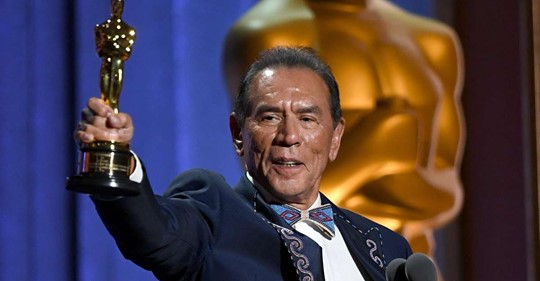
- Details
- By Kaili Berg
At the beginning of Native American Heritage Month, there is no better time to recognize the impact of Indigenous actors who are reshaping how the world sees and understands Indigenous cultures through powerful performances.
Their contributions go beyond performance, as each of them champions advocacy, authenticity, and cultural pride. Here are ten Native American actors whose work has had an indelible impact on Indian Country:
1. Lily Gladstone (Blackfeet and Nez Perce)
Lily Gladstone's portrayal in Killers of the Flower Moon has cemented her as a powerful figure in Indigenous representation. Playing the role of Mollie Kyle, an Osage woman, targeted during the Osage murders of the 1920s, she earned critical acclaim and became the first Native American to win a Golden Globe and an Oscar nomination for Best Actress in a Leading Role.
2. Devery Jacobs (Kanien’kehá /Mohawk)
Devery Jacobs, known for her role as Elora Danan in Reservation Dogs, brings depth and realism to her character, capturing the spirit of Indigenous youth today. Her contributions as a writer on the show further her influence, as she ensures that Indigenous voices are telling Indigenous stories. Jacobs is also a passionate advocate for Indigenous rights and environmental justice, using her platform to bring awareness to critical issues.
3. Jessica Matten (Métis/Red River Cree)
Jessica Matten’s work in series like Tribal and Frontier brings a spotlight to Indigenous struggles and resilience. She often plays strong Indigenous women tackling complex challenges, mirroring her real-life activism, which includes supporting initiatives that combat violence against Indigenous women and promoting youth wellness.
4. Zahn McClarnon (Hunkpapa Lakota)
With iconic roles in Longmire, Westworld, and Dark Winds, Zahn McClarnon is a longstanding champion of Indigenous representation. His nuanced portrayal of Joe Leaphorn, a Navajo police officer in Dark Winds, captures the complexity of reservation life. McClarnon’s career has inspired other Indigenous actors, and he frequently speaks out on behalf of Indigenous arts and culture.
5. Amber Midthunder (Assiniboine and Sioux)
Amber Midthunder redefined Indigenous roles in action with her breakout role in Prey, where she plays a young Comanche woman facing off against the Predator. Midthunder is passionate about broadening Indigenous representation in genres like sci-fi and action, inspiring a new generation of Indigenous talent in Hollywood.
6. D'Pharaoh Woon-A-Tai (Oji-Cree)
As Bear Smallhill in Reservation Dogs, D'Pharaoh Woon-A-Tai captures the journey of a young Indigenous teen navigating life and identity. His charm and authenticity have quickly made him a favorite among fans, and his performance has helped carve a space for Indigenous-led television.
7. Wes Studi (Cherokee)
Wes Studi, a veteran in Hollywood, was the first Native American actor to receive an Academy Honorary Award. Known for his roles in The Last of the Mohicans, Dances with Wolves, and Avatar, Studi has brought Indigenous history and stories to mainstream audiences for decades. He remains a revered figure, often speaking about Indigenous representation and pushing for authentic portrayals in film.
8. Martin Sensmeier (Tlingit and Koyukon-Athabascan)
Martin Sensmeier’s roles in The Magnificent Seven and Yellowstone showcase his versatility and dedication to his heritage. Sensmeier is committed to changing the perception of Indigenous characters on screen, often portraying Indigenous figures as empowered, complex, and resilient. Outside of acting, he actively promotes Indigenous health initiatives and works with Native communities on issues of wellness and representation.
9. Kiowa Gordon (Hualapai)
Known for The Twilight Saga and Dark Winds, Kiowa Gordon is a powerful talent in Indigenous cinema. His role in Dark Winds as Jim Chee, a Navajo detective, explores the intricacies of law enforcement on tribal lands. Gordon’s performances bring important conversations about Indigenous law, culture, and sovereignty to the mainstream, and his commitment to diverse Indigenous narratives is paving the way for more complex stories.
10. Gary Farmer (Cayuga)
A beloved actor, Gary Farmer has portrayed memorable Indigenous characters for years in films like Smoke Signals, Dead Man, and Reservation Dogs. Farmer brings humor and insight into his roles, often playing wise, grounded characters that reflect the wisdom and resilience of Indigenous communities. Farmer’s presence in film has helped keep Indigenous stories visible and respected.
These actors are more than just performers, they are advocates and trailblazers. Through their roles, they bring strength, resilience, and authenticity to the screen, breaking down stereotypes and inspiring future generations.
This Indigenous Heritage Month, let’s celebrate their accomplishments and continue to support the voices they bring to Hollywood and beyond.
More Stories Like This
Watermark Art Center to Host “Minwaajimowinan — Good Stories” ExhibitionMuseums Alaska Awards More Than $200,000 to 12 Cultural Organizations Statewide
Zuni Youth Enrichment Project Takes Top Emerging Artist Apprentices to Phoenix for Artistic Exploration and Cultural Immersion
From Dishwasher to Award-Winning Chef: Laguna Pueblo's Josh Aragon Serves Up Albuquerque's Best Green Chile Stew
Rob Reiner's Final Work as Producer Appears to Address MMIP Crisis
Help us defend tribal sovereignty.
At Native News Online, our mission is rooted in telling the stories that strengthen sovereignty and uplift Indigenous voices — not just at year’s end, but every single day.
Because of your generosity last year, we were able to keep our reporters on the ground in tribal communities, at national gatherings and in the halls of Congress — covering the issues that matter most to Indian Country: sovereignty, culture, education, health and economic opportunity.
That support sustained us through a tough year in 2025. Now, as we look to the year ahead, we need your help right now to ensure warrior journalism remains strong — reporting that defends tribal sovereignty, amplifies Native truth, and holds power accountable.
 The stakes couldn't be higher. Your support keeps Native voices heard, Native stories told and Native sovereignty defended.
The stakes couldn't be higher. Your support keeps Native voices heard, Native stories told and Native sovereignty defended.
Stand with Warrior Journalism today.
Levi Rickert (Potawatomi), Editor & Publisher


